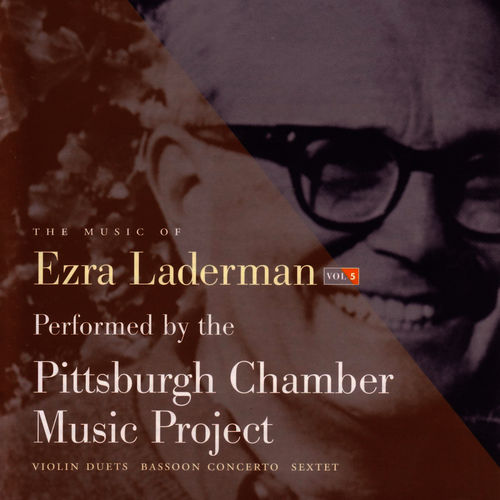
Above is volume five of what would eventually be nine CDs of his music on the Albany label.
Another volume, with a younger photo of the composer on the cover, is shown farther down on this webpage.

| Ezra Laderman incorporated
a lyrical style into a contemporary context, using tonal material in
combination with atonal elements and seeking out unusual formal structures
for his compositions. His writing evolved over the years in that the
music, although rigorously conceived, speaks with immediacy and accessibility. Laderman was born in Brooklyn, New York, on 29 June 1924, and died on February 28th, 2015 at the age of 90. His parents, Isidor and Leah, both emigrated to the U.S. from Poland. Though poor, the family had a piano. Ezra writes, “At four, I was improvising at the piano; at seven, I began to compose music, writing it down. I hardly knew it then, but I had at a very early age made a giant step to becoming a composer.” He attended New York City’s High School of Music and Art, and later studied composition with Stefan Wolpe and with Otto Luening. On April 25, 1943, Laderman was inducted into the U.S. Army and served as a radio operator with the 69th Infantry Division during World War II. During the weeks after the war was over, he composed his Leipzig Symphony. This work brought him recognition within the army, and subsequently he was assigned as orchestrator of the GI Symphony Orchestra. He was discharged from the army on April 22, 1946, and after returning to the States, he received his BA in 1950 from Brooklyn College, and his MA in 1952 from Columbia University. He has taught at Sarah Lawrence College, SUNY Binghamton, and directed the Bennington Composers Conference in 1967-68. In 1988 he was visiting composer at Yale, and from 1989 to 1995 he was Dean of its School of Music. In the fall of 1996 he was named professor of composition at the Yale School of Music. He received three separate Guggenheim fellowships (1955, 1958, 1964) and the Rome Prize (1963). He divided his time between New Haven, Connecticut and Woods Hole, Massachusetts, where his wife, Dr. Aimlee Laderman (a lecturer at Yale) is a limnologist at the Marine Biological Laboratory. Laderman's compositions range from solo instrumental and vocal works to large-scale choral and orchestral music. His eleven string quartets and his concertos for piano, violin, viola, cello, flute, string quartet, and double winds are notable contributions to the repertory. He also wrote music to the Academy Award-winning films "The Eleanor Roosevelt Story" and "Black Fox," and an opera based on the life of Marilyn Monroe. His eleven string quartets and his concertos for piano, violin, viola, cello, flute, string quartet, and double winds are notable contributions to the repertory. Mr. Laderman incorporates a lyrical style into a contemporary context, using tonal material in combination with atonal or aleatory elements, and seeking out unusual formal structures for his compositions. Commissions have come from the Chicago Symphony, Philadelphia Orchestra, New York Philharmonic, Los Angeles Philharmonic, Minnesota Orchestra, National Symphony, Louisville Orchestra, Pittsburgh Symphony, Dallas Symphony, Denver Symphony, Houston Symphony, New Jersey Symphony, Detroit Symphony, New Haven Symphony, CBS-TV (the oratorio Galileo), the Library of Congress and other orchestras, in addition to commissions from such distinguished artists as David Shifrin, Yo-Yo Ma, Emmanuel Ax, Aldo Parisot, Jean-Pierre Rampal, Judith Raskin, Elmar Oliveira, Julius Baker and Robert Bloom, Nathaniel Rosen, Toby Appel, Leonard Arner, Eugene List, Erice Morini, Samuel Baron, Lenox Quartet, Composers Quartet, Tokyo, Audubon, Colorado and Alard Quartet. Laderman’s opera, Marilyn, based on the life of Marilyn Monroe, had its premiere at the New York City Opera in 1993, and the Symphony No. 8 received its New York premiere by the New Haven Symphony in Carnegie Hall in 1994. David Shifrin and the Chamber Music Society of Lincoln Center premiered Laderman’s Clarinet Quintet at Alice Tully Hall in 1994. |
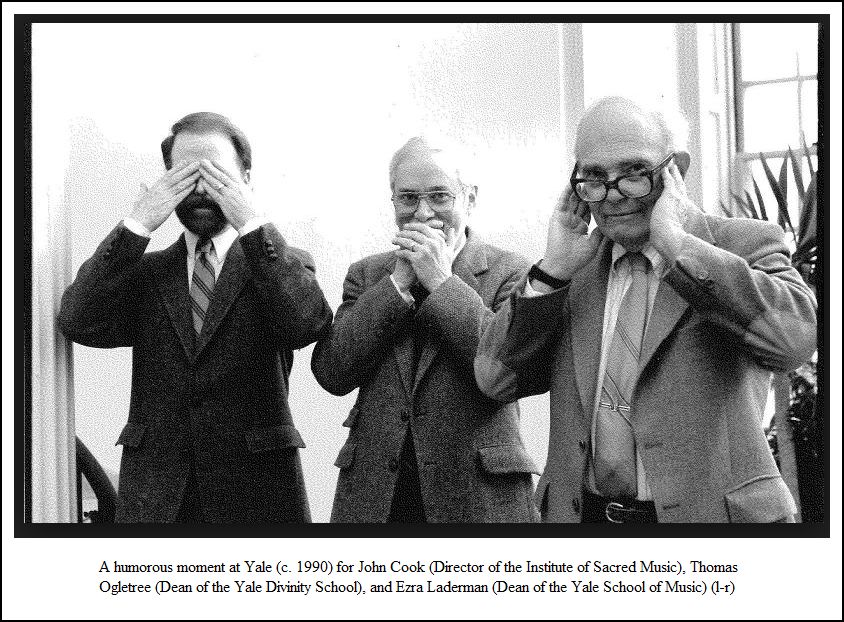
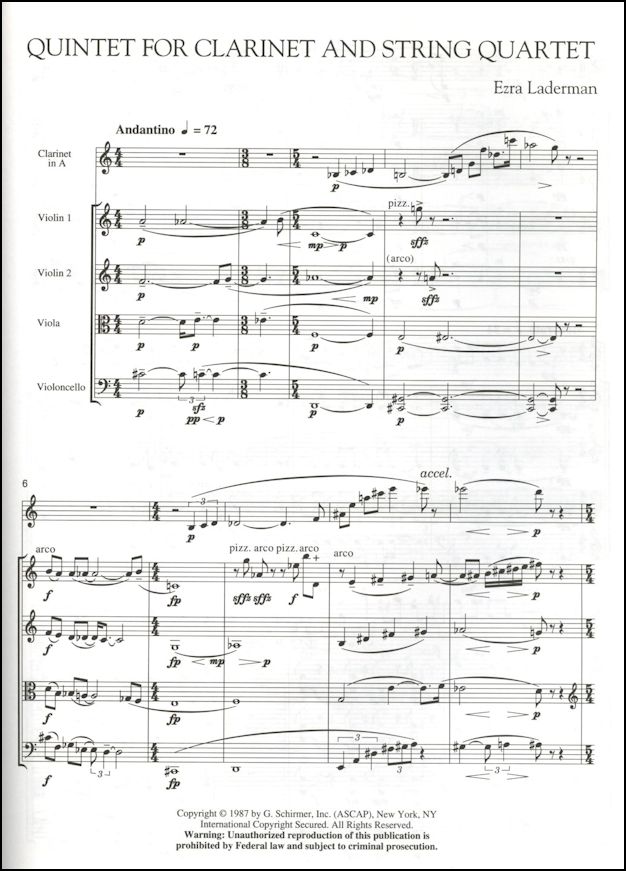 He was in very good humor, and responded to my questions
directly and honestly. The following June, the ninety-minute program
of music and portions of the interview was well received, and it was repeated
in 1994 and 1999.
He was in very good humor, and responded to my questions
directly and honestly. The following June, the ninety-minute program
of music and portions of the interview was well received, and it was repeated
in 1994 and 1999.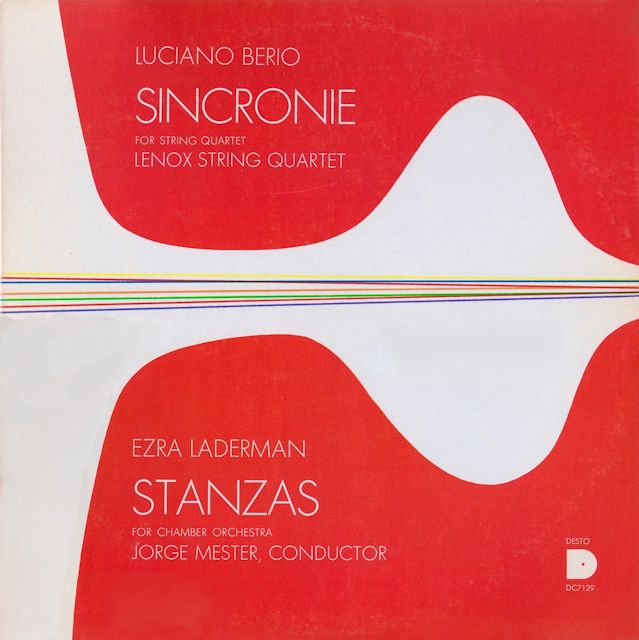 EL: [Thinks a moment] We begin
with the fact that the piece has to have an idea. There has to
be something that makes it work. It can’t just be notes. There
has to be a sense of destiny about where the music is going, whether
it’s Bach, or Mozart, or Beethoven, or Brahms. Whoever the composer
is, there is a sense of destiny and purpose. Whether it’s innate
in the style, whether you are dealing with the Baroque style or the Classical
style, within that style there has to be a sense of purpose and destiny,
and a sense of balance. Within that, the ideas themselves have to
have lasting value. They have to have imagination. They can’t
be cut from the same cookie cutter. It has to be something provocative
that makes the work stand up over the test of time. There has to
be continual interest, whether the interest is based on motivic material,
or harmonic material, or rhythmic material, or a combination of all them.
These elements have to have real interest in order to make the piece want
to be heard over, and over, and over again. I think that really is
the secret. People have had to have heard the piece, or actually
have learned the piece, and have the desire to hear it again or play it
again. I often go to the piano in the morning, before limbering up,
and I inevitably turn to The Well-Tempered Clavier of Bach. I
just go to any one of the Preludes and Fugues, and play it. Sometimes
I practice it, or two or three of them, and I’ve been doing it for thirty
some odd years without ever not loving and working through those pieces.
I consider them to be one of the great testaments of mankind. They
are just amazing in their variety, and in what they do in those two or four
pages that each of these works last. They’re a combination of all kinds
of things that one can then label great... and that word ‘great’ should be
used very sparingly. There are lots of good pieces, but there aren’t
that many really ‘great’ pieces.
EL: [Thinks a moment] We begin
with the fact that the piece has to have an idea. There has to
be something that makes it work. It can’t just be notes. There
has to be a sense of destiny about where the music is going, whether
it’s Bach, or Mozart, or Beethoven, or Brahms. Whoever the composer
is, there is a sense of destiny and purpose. Whether it’s innate
in the style, whether you are dealing with the Baroque style or the Classical
style, within that style there has to be a sense of purpose and destiny,
and a sense of balance. Within that, the ideas themselves have to
have lasting value. They have to have imagination. They can’t
be cut from the same cookie cutter. It has to be something provocative
that makes the work stand up over the test of time. There has to
be continual interest, whether the interest is based on motivic material,
or harmonic material, or rhythmic material, or a combination of all them.
These elements have to have real interest in order to make the piece want
to be heard over, and over, and over again. I think that really is
the secret. People have had to have heard the piece, or actually
have learned the piece, and have the desire to hear it again or play it
again. I often go to the piano in the morning, before limbering up,
and I inevitably turn to The Well-Tempered Clavier of Bach. I
just go to any one of the Preludes and Fugues, and play it. Sometimes
I practice it, or two or three of them, and I’ve been doing it for thirty
some odd years without ever not loving and working through those pieces.
I consider them to be one of the great testaments of mankind. They
are just amazing in their variety, and in what they do in those two or four
pages that each of these works last. They’re a combination of all kinds
of things that one can then label great... and that word ‘great’ should be
used very sparingly. There are lots of good pieces, but there aren’t
that many really ‘great’ pieces.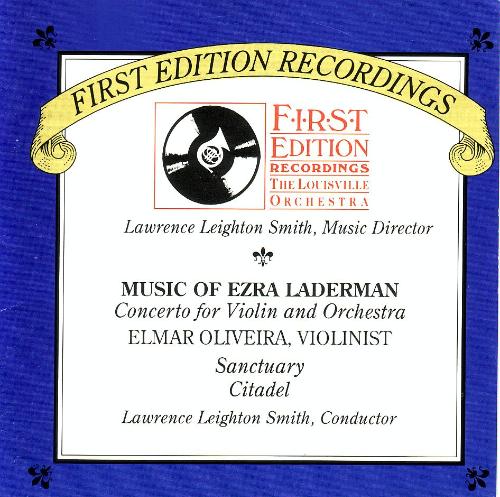 EL: Not only in the New Jersey Symphony
— and they’re quite special
— but all over the world. With the facility that they
have now, they understand it. They have a knowledge of Twentieth Century
music which is remarkable compared to where they were twenty, or twenty-five
years ago. In the United States, this is a result of what’s happening
in the conservatories, such as Juilliard and Eastman. At Curtis
they produce these young musicians that are now the chamber musicians,
the soloists, the orchestral musicians of this country. They can
learn a score of mine in two and half days — five
hours of rehearsal — and that’s terrific.
EL: Not only in the New Jersey Symphony
— and they’re quite special
— but all over the world. With the facility that they
have now, they understand it. They have a knowledge of Twentieth Century
music which is remarkable compared to where they were twenty, or twenty-five
years ago. In the United States, this is a result of what’s happening
in the conservatories, such as Juilliard and Eastman. At Curtis
they produce these young musicians that are now the chamber musicians,
the soloists, the orchestral musicians of this country. They can
learn a score of mine in two and half days — five
hours of rehearsal — and that’s terrific.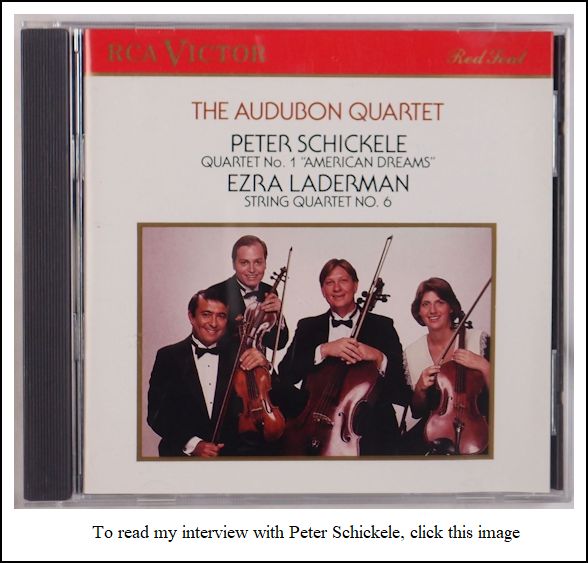 EL: I think it’s too late for
that. I’m influenced mainly by me. As a kid, I used to
be influenced by lots of composers, but as my style has evolved and
matured, my music grew much more concerned with its own evolution than
with being attracted to other aesthetics. That happens with every
composer, and I’m going to be 65 next year, so it is about time I spoke
for myself! [Both laugh] A composer who made that change in
his sixties was Stravinsky, when he felt that he was losing the fight against
the Serial techniques, and was, extraordinarily, turning 180 degrees,
and began to embrace them. That’s very rare. Another composer
was Arthur Berger,
who, growing up into his thirties and forties, was really quite a new
classical composer, again responsive to the Stravinsky milieu. He,
too, made a shift, but that’s very rare. Most composers, like
William Schuman, Aaron
Copland, Vincent Persichetti, and Jacob Druckman evolved, and you
can see the history of their lives with each piece as it emerges.
EL: I think it’s too late for
that. I’m influenced mainly by me. As a kid, I used to
be influenced by lots of composers, but as my style has evolved and
matured, my music grew much more concerned with its own evolution than
with being attracted to other aesthetics. That happens with every
composer, and I’m going to be 65 next year, so it is about time I spoke
for myself! [Both laugh] A composer who made that change in
his sixties was Stravinsky, when he felt that he was losing the fight against
the Serial techniques, and was, extraordinarily, turning 180 degrees,
and began to embrace them. That’s very rare. Another composer
was Arthur Berger,
who, growing up into his thirties and forties, was really quite a new
classical composer, again responsive to the Stravinsky milieu. He,
too, made a shift, but that’s very rare. Most composers, like
William Schuman, Aaron
Copland, Vincent Persichetti, and Jacob Druckman evolved, and you
can see the history of their lives with each piece as it emerges.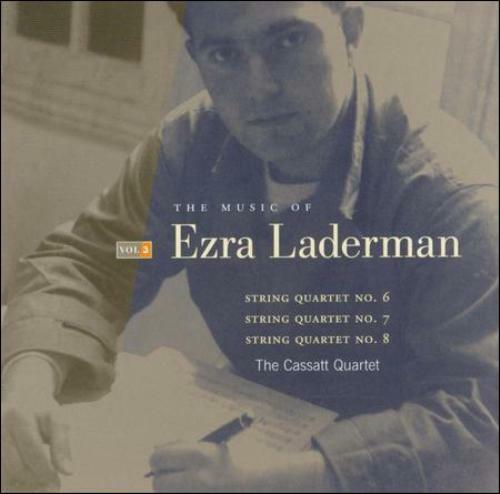 EL: Yes, I guess. It’s not
that I’m displeased with what I’m hearing. Sometimes the problem
is with the composer, not the performer.
EL: Yes, I guess. It’s not
that I’m displeased with what I’m hearing. Sometimes the problem
is with the composer, not the performer.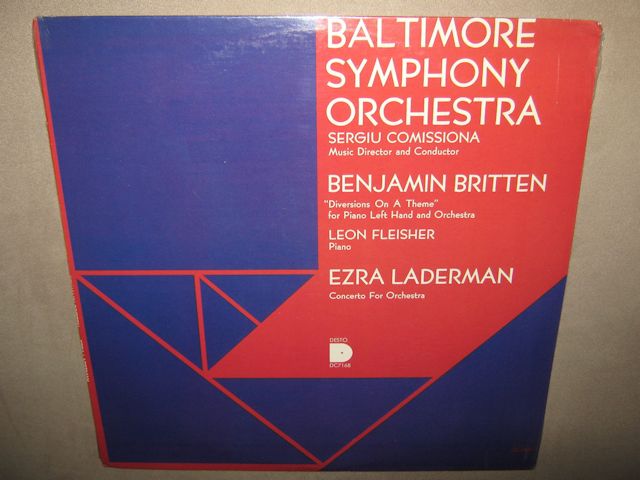 EL: Any advice that I would give
— and there’s nothing one can do about it
— is to have a thick skin. Too many talented
composers and young composers crumble apart because they can’t take
criticism. Whether it’s verbal or written, they fall apart.
They must somehow have the ability to withstand that and accept it, and
go on to develop one’s craft. In my own class, when I doing my Master’s
at Columbia University, we had a class of about fourteen. We were working
with Otto Luening, and
it was a wonderful class. There was tremendous talent in that class,
and of that class, one of the composers who survived with me was named Roy
Travis (1922-2013), who was out in California all these years. Every
other one, somehow, gave up the ghost. All of them were initially getting
performances, and doing the things that young composers do in order to
develop some kind life and some kind of career as a composer. But
at different points along the way, they all stopped. They all gave
it up. So you need a thick skin. You will need to have that
ability to withstand the adversity that inevitably is going to come.
Somehow you must have enough confidence in your own worth that you can
keep going with enthusiasm. So, that would be one bit of advice.
EL: Any advice that I would give
— and there’s nothing one can do about it
— is to have a thick skin. Too many talented
composers and young composers crumble apart because they can’t take
criticism. Whether it’s verbal or written, they fall apart.
They must somehow have the ability to withstand that and accept it, and
go on to develop one’s craft. In my own class, when I doing my Master’s
at Columbia University, we had a class of about fourteen. We were working
with Otto Luening, and
it was a wonderful class. There was tremendous talent in that class,
and of that class, one of the composers who survived with me was named Roy
Travis (1922-2013), who was out in California all these years. Every
other one, somehow, gave up the ghost. All of them were initially getting
performances, and doing the things that young composers do in order to
develop some kind life and some kind of career as a composer. But
at different points along the way, they all stopped. They all gave
it up. So you need a thick skin. You will need to have that
ability to withstand the adversity that inevitably is going to come.
Somehow you must have enough confidence in your own worth that you can
keep going with enthusiasm. So, that would be one bit of advice.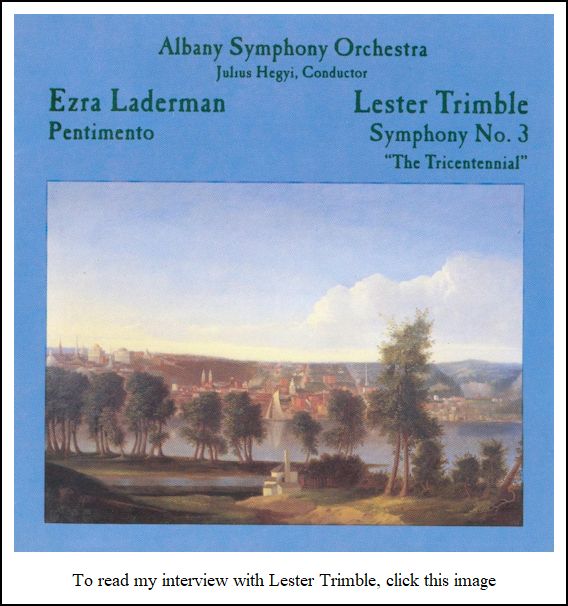 BD: [With a gentle nudge] Like the Farewell
Symphony. [Both laugh]
BD: [With a gentle nudge] Like the Farewell
Symphony. [Both laugh]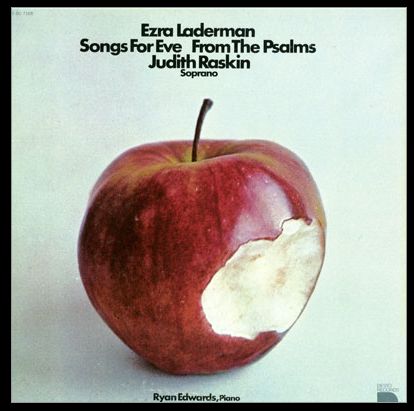 EL: Well, there are only joys. If I had another
life as a composer, I’d probably do what Ned Rorem did, which is
write lots and lots of songs. I’ve written only a few song cycles,
but I’ve written a great deal for the voice with cantatas, and oratorios,
and different kinds of works which get fewer performances. But
I’ve written a great deal for the voice, and I love writing for the voice.
There are two kinds of singers, and I love them both. One kind
is the singer who really sings exactly what you’ve written, and they’re
great. This includes Jan DeGaetani, and Lucy Shelton. Then
there are the other singers who sing with a lot of interpretive feeling,
but they bend your music, and they make it into something very personal.
I also love those singers, and pre-eminent among those who I’ve composed
for is Judith Raskin. Then there are singers that do everything, and
do it all beautifully, and the ones who are closest to me and have sung a
lot of my music, are people like Sherrill Milnes, and Ara
Berberian, and Hilda Harris, and Johanna Meier. I’ve
loved writing for the voice, and that’s certainly something that I would
want to do more of. If singers were to come to me and say they
want pieces... in fact, there was a very interesting commission that
I couldn’t accept the last year. A quartet wanted me to write a
work for soprano and string quartet because they were going to do the
Schoenberg String Quartet which uses a voice, and they wanted a
companion work. They wanted to commission me to write a work for
soprano Dawn Upshaw and
their string quartet, but they needed it too quickly. I couldn’t do
it.
EL: Well, there are only joys. If I had another
life as a composer, I’d probably do what Ned Rorem did, which is
write lots and lots of songs. I’ve written only a few song cycles,
but I’ve written a great deal for the voice with cantatas, and oratorios,
and different kinds of works which get fewer performances. But
I’ve written a great deal for the voice, and I love writing for the voice.
There are two kinds of singers, and I love them both. One kind
is the singer who really sings exactly what you’ve written, and they’re
great. This includes Jan DeGaetani, and Lucy Shelton. Then
there are the other singers who sing with a lot of interpretive feeling,
but they bend your music, and they make it into something very personal.
I also love those singers, and pre-eminent among those who I’ve composed
for is Judith Raskin. Then there are singers that do everything, and
do it all beautifully, and the ones who are closest to me and have sung a
lot of my music, are people like Sherrill Milnes, and Ara
Berberian, and Hilda Harris, and Johanna Meier. I’ve
loved writing for the voice, and that’s certainly something that I would
want to do more of. If singers were to come to me and say they
want pieces... in fact, there was a very interesting commission that
I couldn’t accept the last year. A quartet wanted me to write a
work for soprano and string quartet because they were going to do the
Schoenberg String Quartet which uses a voice, and they wanted a
companion work. They wanted to commission me to write a work for
soprano Dawn Upshaw and
their string quartet, but they needed it too quickly. I couldn’t do
it.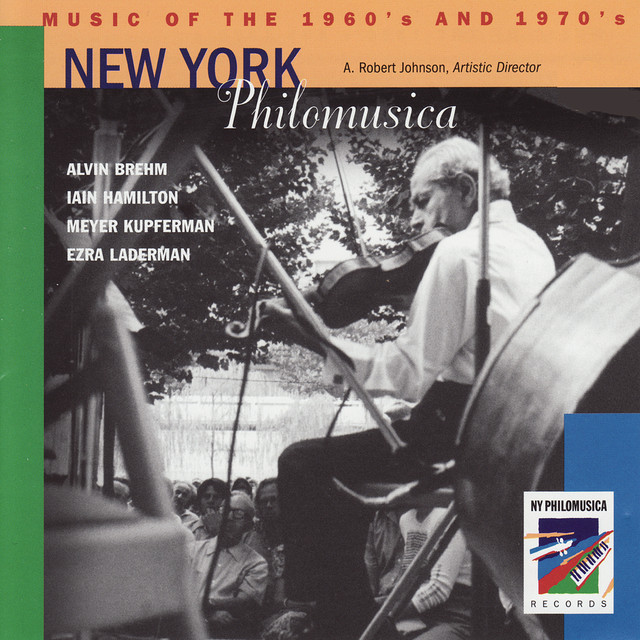 BD: I hope you don’t want to disown any of your old pieces.
BD: I hope you don’t want to disown any of your old pieces.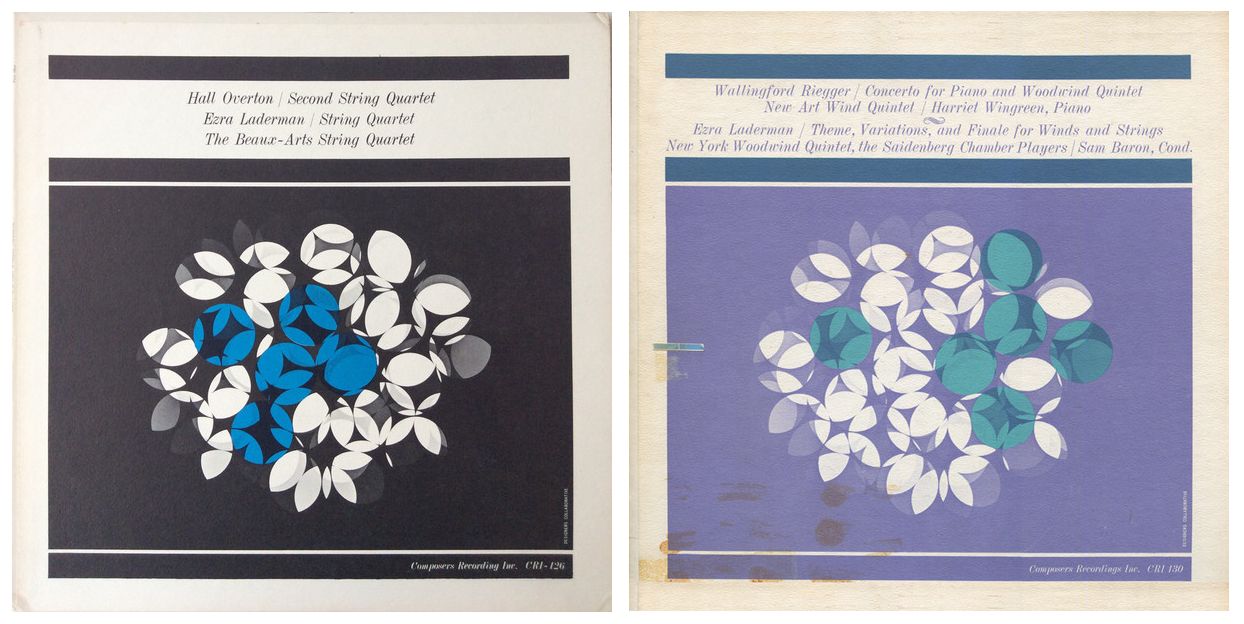
© 1988 Bruce Duffie
This conversation was recorded on the telephone on September 7, 1988. Portions were broadcast on WNIB the following year, and again in 1994 and 1999. This transcription was made in 2019, and posted on this website at that time. My thanks to British soprano Una Barry for her help in preparing this website presentation.
To see a full list (with links) of interviews which have been transcribed and posted on this website, click here.
Award - winning broadcaster Bruce Duffie was with WNIB, Classical 97 in Chicago from 1975 until its final moment as a classical station in February of 2001. His interviews have also appeared in various magazines and journals since 1980, and he now continues his broadcast series on WNUR-FM.
You are invited to visit his website for more information about his work, including selected transcripts of other interviews, plus a full list of his guests. He would also like to call your attention to the photos and information about his grandfather, who was a pioneer in the automotive field more than a century ago. You may also send him E-Mail with comments, questions and suggestions.